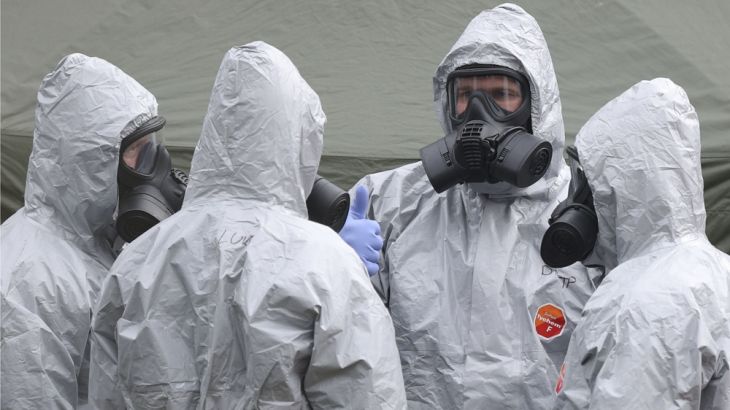UK accuses Russia of spying on Sergei Skripal for five years
Russian ambassador rejects claims made by top British security official in letter to NATO head on spy poisoning case.

Britain’s national security adviser has said Russian intelligence agencies had been spying on Sergei Skripal, a former Russian double agent, and Yulia Skripal for at least five years.
Mark Sedwill made the assertion in a letter made public on Friday, addressed to Jens Stoltenberg, NATO’s secretary-general, explaining Britain’s conclusion that the Russian government is to blame for the military-grade nerve agent used against the Skripals.
Keep reading
list of 4 itemsUS slaps fresh sanctions on Russia over Skripal affair
MI6 chief warns Russia: Don’t underestimate the West
Second suspect in Skripal poisoning identified: Report
He said only Russia had the “technical means, operational experience and the motive” for the attack.
Skripal, 66, a former colonel in Russia’s military intelligence who betrayed dozens of agents to Britain’s MI6 foreign spy service, and his daughter Yulia, 33, were found unconscious on a bench in the cathedral city of Salisbury on March 4.
It was the first incident of a nerve agent being deployed in Europe since World War II.
Theresa May, the British prime minister, has said the Skripals were attacked with one of the Novichok group of poisons, which had been developed by the Soviet Union in the 1970s and 80s.
‘Clear motive’
Sedwill said that after the Soviet Union collapsed, Russia signed the Chemical Weapons Convention but did not report its ongoing work on Novichok.
He said Russia had a proven record of state-sponsored assassinations and had tested ways of delivering chemical weapons, including using door handles to spread nerve agents, as Britain believes was done in the Skripal case.
Sedwill also said Russia had a clear motive for attacking Skripal, a former Russian military intelligence officer who had been imprisoned in Russia for spying for Britain, only to be set free in a spy swap.
|
|
“We have information indicating Russian intelligence service interest in the Skripals, dating back at least as far as 2013 when email accounts belonging to Yulia Skripal were targeted by GRU (military intelligence) cyber specialists,” he said.
Alexander Yakovenko, Russia’s ambassador to the UK, dismissed Sedwill’s charges as unfounded and untrue.
Moscow has vigorously denied any involvement and suggested that the UK carried out the attack to stoke anti-Russian hysteria.
Nevertheless, the attack has prompted the biggest Western expulsion of Russian diplomats since the Cold War, with the UK’s allies in Europe and North America concurring that Moscow was either responsible for the attack or had lost control of the nerve agent.
Russian denial
Russia strongly denies the UK’s claims about Novichok, saying it destroyed its entire Soviet-era chemical weapons arsenal last year under international oversight.
It insists that the nerve agent used on the Skripals could easily have been manufactured in any other country with an advanced chemical research programme.
The British government has requested a special meeting with the Organisation for the Prohibition of Chemical Weapons (OPCW) to discuss the findings.
The UN Security Council, of which Russia is a member, will also hold a meeting next week.
The OPCW confirmed on Thursday that the lethal poison used in the attack on the Skripals was a military-grade nerve agent “of high purity”.
|
|
The OPCW tested samples from Salisbury in four laboratories and confirmed the UK’s conclusion about the substance that had been used.
“The results of analysis by OPCW-designated laboratories of environmental and biomedical samples collected by the OPCW team confirm the findings of the United Kingdom relating to the identity of the toxic chemical,” the published summary said, adding that the toxic chemical was of “high purity”.
However, the OPCW did not explicitly name Novichok in its published summary, nor did it say where the chemical may have come from.
Speaking on Friday, Sergey Lavrov, Russia’s foreign minister, said the OPCW report offers nothing to support Britain’s claims that Russia was behind the attack.
“I want to underline: the OPCW only has confirmed the composition of the chemical agent,” he said.
Separately, Maria Zakharova, Russian foreign ministry spokesperson, said Moscow would not accept any conclusions about the poisoning unless Russian experts were given access to the investigation.
Expert opinion
Richard Guthrie, an independent chemical-weapons expert, says an important detail in the investigation is that the toxic substance is of “high purity”.
“It’s very difficult to make a highly toxic chemical to this high level of purity without a lot of effort,” he told Al Jazeera.
“Normally, you don’t worry about some impurities because they don’t get in the way of the major task that you’re using the chemical for, which is to poison someone.
“So you only remove the impurities if you are trying to make it difficult for people to point the finger back at you.”
Yulia Kripal was released from hospital this week. Sergei Kripal remains hospitalised, but British health officials say he is recovering.